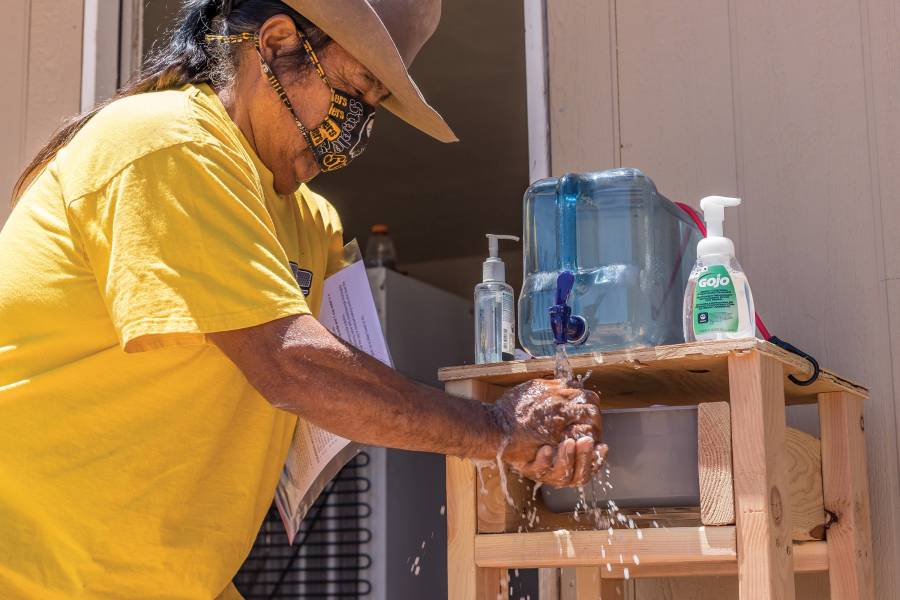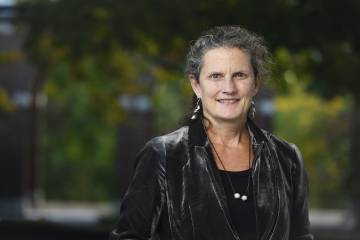When the first cases of COVID-19 surfaced in China in early January, Allison Barlow, SPH '97 (MPH), director of the Johns Hopkins Center for American Indian Health, knew that controlling the coronavirus was going to be particularly difficult on reservations, where health disparities are starkly apparent.
The center's website notes that American Indian people were "once the healthiest people on earth [but] today face critical health disparities, including the highest rates of obesity, diabetes, youth suicide, chronic liver disease, injuries, pneumonia, heart disease, and substance abuse of any racial or ethnic group in the U.S." For generations, residents of some tribal communities have lived in overcrowded tract housing without running water, indoor plumbing, or reliable electricity. Treaties that had promised health care, housing, and education in perpetuity were broken.
That's where the Center for American Indian Health steps in, having worked since 1990 to prevent infectious disease and promote positive health outcomes in Native American populations. Barlow joined the center in 1991, and soon after she enrolled in the part-time Master of Public Health program at the Bloomberg School of Public Health. The skills-based MPH training, she said, "braided with my on-the-ground experience in the tribal communities we serve." The degree provided an important foundation for her career at the center, where she was named director in 2016.
Over nearly 30 years at Hopkins, Barlow has cultivated a front-line perspective on American Indian health issues. She notes that while the coronavirus pandemic has disrupted the lives of Native Americans, it has also provided them with new opportunities to demonstrate their communities' strength and resilience. Native cultures have immense respect for elders, and the White Mountain Apache set up an isolation care unit for older convalescent patients. Tribal sovereignty allowed leaders to quickly enact policies to effectively contain the virus. Tribes enacted shelter-in-place orders prior to the first reported cases on their territory and before many states had enacted similar policies.
Likewise, the COVID-19 crisis has elicited new levels of dedication from center staff and unprecedented generosity from its donors. Initially, Barlow recalled, "we went to a handful of longtime donors to help, and they delivered overnight, without a thought." She credits donors with "enabling us to give our staff and their communities assurance that we are there to stay for as long as our services are needed and welcome."
Ellen and Michael Kullman and family, longtime major donors to the center, were among the first to step up to help with COVID-19 relief. Ellen, through her role as CEO of face shield manufacturer Carbon, got thousands of personal protective equipment donations from both Carbon and Adidas. Likewise, Brian Roberts and his family paid off a multiyear pledge early, which ensured the center had the cash in hand to offer strong and immediate assistance on the reservations.
Barlow stressed the importance of existing donors for mounting a historic response to COVID-19. "Most people in the academic world live grant to grant, and if money runs out, you lose your workforce. Private donors, therefore, have been critical for enabling center staff to maintain strong trust relationships with tribal communities." The center raises discretionary funds that ensure that its community-based workforces have job security. Donors' high level of consistency year after year is therefore essential to maintaining community trust.
After the center was featured in The New York Times, Today, and other outlets for its pandemic response efforts, staff were able to focus the influx of new donations on a comprehensive approach. Their top priority was expanding testing and contact tracing where the center had boots on the ground. After PPE arrived at the center from around the world, staff distributed it to tribes in Arizona, New Mexico, Montana, Michigan, and Wisconsin. The center purchased more than 10,000 face shields manufactured by JHU in Dundalk, Maryland, and sent them to tribal communities across the U.S. Other critical initiatives include building hand-washing stations in communities with no running water and hiring six Apache seamstresses to sew 2,000 masks for White Mountain Apache communities. The new donations have helped make all that possible, Barlow says.
With so many tribal communities reaching out for help, the center is now sharing a portion of its donations with three national tribal organizations who are helping to get more relief packages to tribes across the U.S. This kind of cooperation, Barlow noted, "breaks down silos and expands our network so that we can figure out who can do what best and marshal our combined strengths. In addition, we are now working with the Harvard Kennedy School's American Indian Economic Development Program to develop a digital toolkit to guide tribal leaders in their COVID response."
The coronavirus pandemic has strengthened existing support networks and raised public awareness about Native communities' needs and important legacy. Tribal organizations have told the center that "we can't stop with relief boxes and hand-washing stations. We have to think forward about how to repair health infrastructure in ways that are culturally appropriate, improve access to healthy foods, and extend basic services like internet and electricity." The COVID crisis has, Barlow said, enabled the center to "get some traction to be able to pull more resources toward Native communities, and that will really help in the long run."
Posted in Alumni
Tagged philanthropy, center for indigenous health, coronavirus









